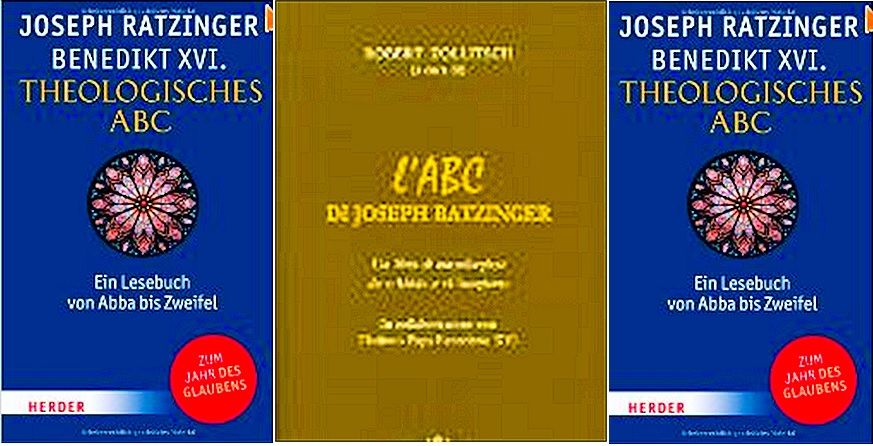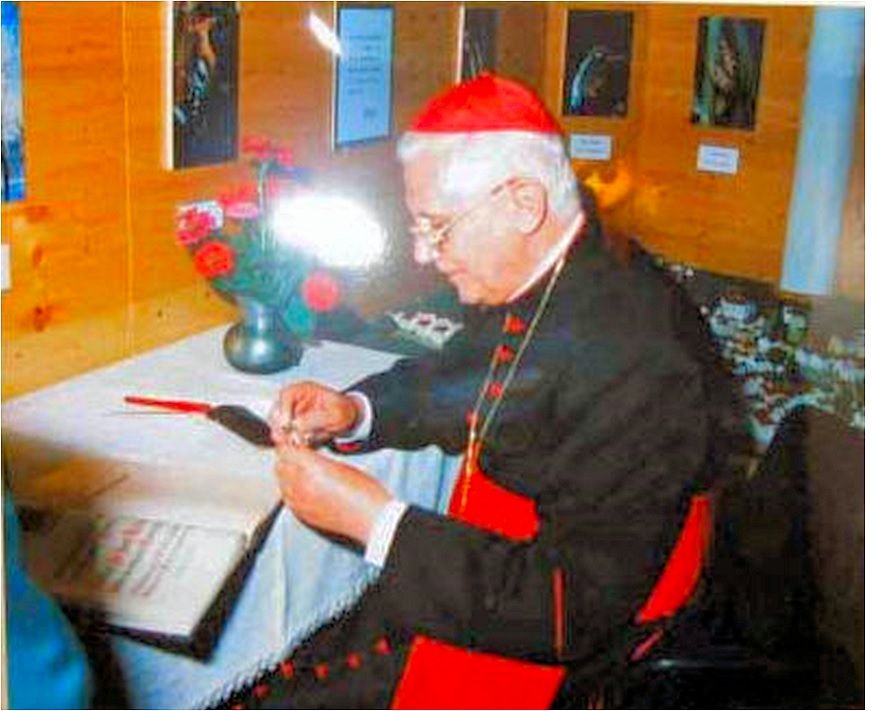 Not expecting to find anything about Benedict XVI in current issues of the OR - unless there was an event that involved him directly, as his March 23 meeting with Pope Francis - I missed this article published in its earlier this week, which was not missed by either Lella or by Beatrice, who also provides the appropriate photograph for the occasion... The excerpt is from a previously unpublished homily given by then Cardinal Joseph Ratzinger in his birthplace of Marktl am Inn in 1997...
From Vatican-I to Vatican-II:
Not expecting to find anything about Benedict XVI in current issues of the OR - unless there was an event that involved him directly, as his March 23 meeting with Pope Francis - I missed this article published in its earlier this week, which was not missed by either Lella or by Beatrice, who also provides the appropriate photograph for the occasion... The excerpt is from a previously unpublished homily given by then Cardinal Joseph Ratzinger in his birthplace of Marktl am Inn in 1997...
From Vatican-I to Vatican-II:
The window of faith
by Cardinal Joseph Ratzinger
Translated from

April 10, 2013
Editor's Note: There are 164 excerpts chosen to present the theological thought of Joseph Ratzinger in the Italian edition from the Vatican publishing house LEV of a book first published by the German publishing house Herder in 2012, edited by Archbishop Robert Zollitsch of Fribourg, who is also president of the German bishops' conference, in collaboration with the Regensburg-based Institut Papst Benedict. [The German original is entitled THEOLOGISCHES ABC: Ein Lesebuch von Abba bis Zweifel (Theological ABC: A Reader from Abba to Zweifel) [Zweifel means doubt]. The Italian edition is entitled L'abc di Joseph Ratzinger (208 pp, LEV, 2013).

Surely, the Italian edition has the ugliest, most unappetizing book cover one could imagine! What LEV bigwig approved it???
The book, citing what Joseph Ratzinger has said about topics ranging from 'Abba' (Father0 to 'Vocation', includes some unusual and even unexpected headings such as Aggiornamento, Antico Testamento e cristianesimo (The Old Testament and Christianity), Ateismo: la sua funzione positive (Atheism: Its positive function), Chiesa peccatrice (the sinner Church], Demitizzazione della Bibbia (Demythifying the Bible), Domenica giorno della speranza (Sunday as the day of hope), Dottrina della reincarnazione e vita eterna (the doctrine of reincarnation and eternal life), Dubbio (Doubt), Essere come bambini (To be like children), Evoluzione e continuità nella Chiesa (Evolution and continuity in the Church), Festa (Celebration), Gioco (Play), Infallibilità della Chiesa (the infallibility of the Church), Inri: l’iscrizione della croce (INRI: The inscription on the cross), Lutto (mourning), Morire e lasciarsi morire, (Dying and allowing death), Sabato santo: disceso nel regno degli inferi (Holy Saturday: the descent into the kingdom of hell), Senso della vita (the meaning of life), Teoria dell’evoluzione e fede nella creazione (Theory of evolution and faith in creation), Umiltà (humility), Unità e integrità della Sacra Scrittura (The unity and integrity of Sacred Scripture), Verità e storicità (Truth and historicity).
This singular dictionary is striking in its choice of brief texts from the works of Joseph Ratzinger/Benedict XVI, resulting in a small but precious anthology that also draws from less-known texts written by the young Ratzinger, and including one previously unpublished - a homily delivered by Cardinal Ratzinger on July 13, 1977, on a visit to his birthplace in Marktl am Inn, which we are publishing herewith.
The First Vatican Council took place at a time when, after the Franco-Prussian War, two great nation states emerged – Germany and Italy.
At the same time, the State of the Church, that is, the temporal power of the Papacy, definitively disappeared from the geographical maps and from history. At that time, therefore, Vatican I donned purely spiritual vestments, free of any temporal ballast from the papacy, and defined it in a new way, as a discipleship of Christ that was devoid of any earthly power from hereon, just as Peter, the fisherman, had followed Christ, without any powers at all, to his ultimnate crucifixion in Rome.
From all this, we can experience great relief as well as some regret. A relief because the change came much more easily than it was thought, and perhaps some regret for some hings that might have been conserved.
But it is important that at the time when the principle of the nation state was celebrating it triumph, when the nation even came to be an object of adoration, Vatican I opposed to it the principle of unity. Yes, the nation is a value, that was not being contested. But when it becomes absolutized, then it becomes dangerous.
In the history of the past 145 years, we have seen how uch blood and tears have been shed because of the inebriation with nationalism, not just in Europe but in the whole world. Everyone (including us Christians, and Catholics) had become first of all Germans, Frenchmen, Italians, Englishmen, etc, and only secondarily Christian and Catholic.
We have forgotten much of what we have learned from Scripture, that we all, in our diversity, which should be a richness of being together, are destined to be children of God together, brothers of Jesus Christ, a great family – and that the world, as Scripture tells us, will not be united by the power of an especially important nation that sees herself as dominant or chosen, but through him who brings together heaven and earth – Jesus Christ.
Thus, applying the principle of unity over and above national boundaries - although unfortunately elusive in our history - became greatly relevant then, as it is today. That principle of unity is urgent today because we have become involved in so many political and economic entanglements and dependencies from which no one can escape. Most especially not if we would retreat to the spiritual and religious dimension, to our own world, into our shell.
So even if our current sympathies are not necessarily for a specific group, we cite ‘conscience’, which is often only a cover name for our personal desires and opinions, as the court of last resort.
All of which may have intrinsic value but one must understand it - and it becomes true and right – if it is framed within the great truth of our being, which comes from God the Father, from Jesus.
For this reason, we must continue to be grateful for the fact that the Pope exists as a reference point for unity, as the visible symbol of unity. And we must recognize that unity is not just a gift, but it also makes demands on us, and can only enrich us afterwards. We must seek to share in this great unity whatever is ‘ours’, in order that we, too, can be able to receive from others...
What then is the message for us from the Second Vatican Council? From its many documents, it is not easy to extrapolate a central message. Yet we must remember that Vatican I was unfinished because of war, and so it could not reach a conclusive message.
Vatican II continued what had been interrupted, and shaped the definitive word about the Church today – a definitive word that was once again proclaimed – Christ. The first sentence of the Vatican II Constitution on the Church reads: “Christ is the light of the world” (Lumen gentium I).
And the Church exists to disseminate this light. The Church does not exist for herself, but as the window that allows the light of Christ to penetrate into our world.
 Cardinal Ratzinger signing a guest book in Marktl at the time of the visit referred to above. Beatrice shot this from the museum in Marktl when she visited in 2006.
Cardinal Ratzinger signing a guest book in Marktl at the time of the visit referred to above. Beatrice shot this from the museum in Marktl when she visited in 2006.
[Modificato da TERESA BENEDETTA 12/04/2013 09:39]